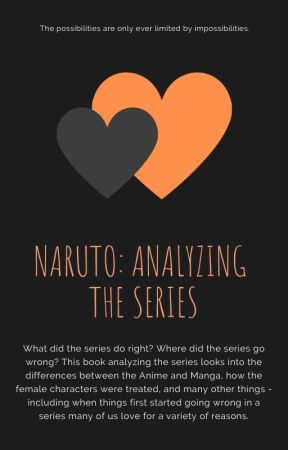Kishimoto is a bad writer.
There, I said it.
It, being that Kishimoto is a bad writer, something I think quite a few fans of the Naruto series who would argue vehemently against despite the fact quite a few fans would argue Kishimoto left us with a majorly lacking ending to the series. Of course, here is where I'll openly admit it is within probability for a stellar series to have an ending that was majorly lack luster. The thing is Naruto isn't one of these series.
The fact Naruto ended poorly, while a surprise for others, wasn't at all surprising to me.
It was something I was expecting for a very long time.
Now that I've got that off my chest, let me say this.
Isn't whether he's a bad writer subjective?
No, no it's not.
In fact, as a writer and an artist, one of the things which drives me nuts is this idea that what does or doesn't constitute a bad writer is subjective. In fact, I think a lot of the toxicity in fandom comes about because we treat fiction as something which is measured by subjective criteria and that there aren't any objective criteria to measure – well, anything by.
Of course, in bringing up objective and subjective criteria we've got to discuss the fact some people don't understand that the question of whether a work is good or not has nothing to do with personal likes and dislikes but is about the actual quality of the work. In fact, I've had someone once try arguing the question itself is subjective when in reality it's not.
Seriously, if someone wanted to know whether you liked or disliked something they'd ask if you liked or disliked something, not whether the series was good or not. A few might argue that the word good can mean something enjoyable rather than the actual quality of the work, but context is important. The conversation is still meant to be about the quality of the work, not whether you like or dislike something.
Isn't it impossible to like something which isn't of good quality?
No, not at all.
Of course, here's where I bring in Twilight to the discussion. Prior to the Twilight series, the idea that someone could possibly like something of poor quality was a foreign concept within fandom, though in truth I think it always existed – we simply didn't admit that we were a fan of something of low quality because this typically meant opening ourselves up for ridicule, yet the stigma of liking something for enjoyment purposes only still remains today.
Why do I like the Twilight series? The draw for me is certain characters such as Alice, yet the fact I love certain characters also makes me realize these characters ended up rather wasted within the narrative because everything was about Bella Swan, but everything morphed unnaturally around her as it does in the Naruto series.
Naruto is the titular character, so shouldn't the narrative morph around him?
Nope.
Actually, those who try arguing this have honestly not heard of the I Am Not Shazam trope. They don't know about the Protagonist Title Fallacy trope either. They don't know about Secondary Character Title, Title Confusion, or Antagonist Title. One of my favorites is when the Namesake trope overlaps with any of these. These are just titles where the protagonist isn't the titular character.
However, the argument here is that because the character is the title character, he or she should, in fact, get special treatment that a character who isn't the titular character wouldn't get. As I've pointed out, being the titular character doesn't mean you're the main protagonist, so why would it mean that they would get special treatment? More importantly, aren't we using the fact they are a titular character to excuse the bad writing? Added, there are plenty of stories where the main character is the main protagonist without warping the narrative around them.

YOU ARE READING
Naruto: Analyzing the Series
AcakFor many fans of Naruto, the ending proved a major eye opener. Others weren't surprised the ending proved lackluster, pin pointing various places where the series started going wrong. Despite all of this, the fans of Naruto still love the series, ye...
